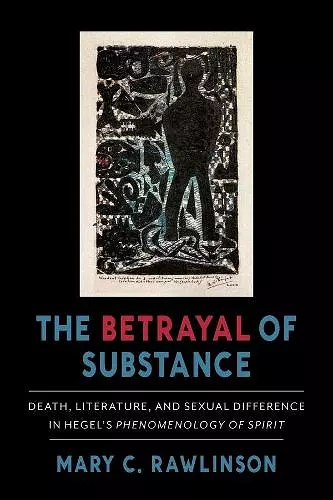The Betrayal of Substance
Death, Literature, and Sexual Difference in Hegel’s “Phenomenology of Spirit”
Format:Paperback
Publisher:Columbia University Press
Published:17th Nov '20
Should be back in stock very soon

Hegel’s Phenomenology of Spirit exerts a unique influence on contemporary philosophy. Major figures from Jacques Derrida and Luce Irigaray to Jean-Paul Sartre and Judith Butler were shaped in large part through their engagement with Hegel’s challenging masterwork. It unfolds a grand narrative of the ways of thinking and acting that comprise human experience. Along the way, Hegel seeks to incorporate all the fundamental structures of human life—from political community to consciousness to selfhood—into a whole that encompasses the total movement of human knowledge and culture.
Mary C. Rawlinson offers a critical reading of the Phenomenology of Spirit that exposes three crucial elisions: Hegel’s effacements of sexual difference, human mortality, and literary style. In attempting to arrive at an “absolute knowing” that would transcend all differences, Hegel discounts specificity in each of these areas in favor of a generic subject. Rawlinson turns Hegel’s critique of abstraction against him, showing how his own phenomenological analysis undermines his attempt to master difference. Rawlinson’s critique reveals Hegel’s attempt to erase the difference of his own style, highlighting his images, tropes, and rhetorical strategies. Demonstrating how the power of Hegel’s phenomenological method goes beyond even Hegel’s own project of a pure logic, The Betrayal of Substance is a magisterial rereading of the Phenomenology of Spirit that encompasses crucially overlooked sites of complexity and difference.
Mary Rawlinson has written an elegant, nuanced analysis of Hegel’s phenomenology that addresses its constitutive limits. She undertakes a Hegelian critique of Hegel, revealing his blindspots—his understanding of sexual difference, the finite individual, and the arts in general—while affirming his insights regarding the play of difference in human history. -- Elizabeth Grosz, author of The Incorporeal: Ontology, Ethics, and the Limits of Materialism
Mary Rawlinson’s The Betrayal of Substance elaborates a sophisticated and thought-provoking Hegelian critique of Hegel himself. With decades of experience deftly interpreting Hegel’s philosophy, Rawlinson powerfully argues for a phenomenology of death, literature, and sexual difference as singular instances resisting uptake into any purported encyclopedic System of Absolute Knowledge. -- Adrian Johnston, author of A New German Idealism: Hegel, Žižek, and Dialectical Materialism
The Betrayal of Substance provides one of the most thorough and careful readings of Hegel's Phenomenology of Spirit to date. Rawlinson sees the limitations of what Hegel is doing while appreciating the magnitude of his achievement. This book's project is distinct, and its voice is singular. -- Todd McGowan, author of Emancipation After Hegel: Achieving a Contradictory Revolution
The Betrayal of Substance is a careful elucidation of The Phenomenology of Spirit which pays equal attention to its blind spots. Rawlinson argues, persuasively, that despite his enduring emphasis on life, Hegel betrays his phenomenological project in untethering consciousness from its immediate sensuous existence. Responding to these betrayals, she outlines a new conception of the political inspired by Hegel but based on creativity and the material aspects of public life. -- Elaine Miller, author of Head Cases: Julia Kristeva on Philosophy and Art in Depressed Times
ISBN: 9780231199056
Dimensions: unknown
Weight: unknown
264 pages